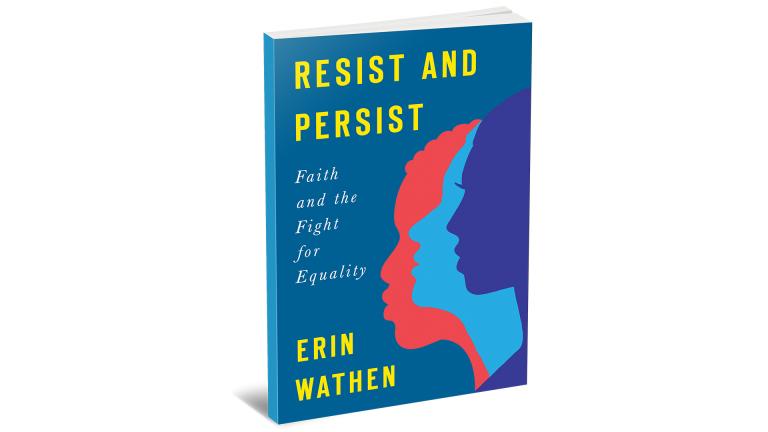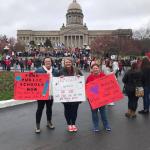I wrote a book last summer. It made me really angry.
That book *officially* releases today. It’s a conversation about faith and feminism, and the patriarchal worldview that shapes every system we’re a part of. I paid special attention to the reality of having a blatant misogynist in the White House, and what it means that so many women voted for him.
The publishers approached me with the book concept shortly after the 2016 election, when public outrage was fresh and women were in a particularly WTF kind of place about how we got here. I agreed to ride/write the wave. It seems like ages ago since I hit “send” on the last chapter, and gathered up the huge pile of books I needed to take back to the library. And in many ways, it has been a long time. So much has happened in the last 6 months, including #MeToo– which hit its stride right after the book went to press.
I thought the process of researching and writing this book would be cathartic. In some ways, it was. But in many ways it just served to confirm the maddening truth I’ve known all my life: the world does terrible things to women. Every institution that shapes civilization is designed to perpetuate the cycles of patriarchy, and in many ways, we–as women–are complicit in our own subjugation. The work that I thought might help me make peace with that reality was really just an exercise in refining the slow burn. I was so angry. I kind of feel bad for my husband. I’m sure I was… a lot. Like, more “alot” than usual.
Contrary to what the voice of patriarchy will tell you: feminists do not hate men. I’ve been married for almost 15 years and I haven’t made him move to the garage yet, so there’s that. I have a good relationship with my dad, and I’m my brother’s biggest fan. I’ve got good working relationships with male colleagues; several of whom I keep on speed dial for rough ministry days or for life in general. Some of my best friends growing up were guys and we keep in touch. My home boys turned out okay. I also serve in a congregation of men who willingly show up on Sundays to a church where they know a woman will be in the pulpit. Those are the men you want to have around.
But. Even though my own relationships with men have been (mostly) positive, the process of writing this book was an exercise in recalling every harassment, every unwanted touch, every crowding of my personal space; every dismissive comment, every derogatory name called, every friendship jeopardized or broken by four little words: “women can’t be ministers.”
At the same time, it was a trip through the history of our faith and culture, a visit to all the moments at which women were written out of the narrative or relegated to supporting roles; and all the systemic ways we’ve been intentionally abused, subverted and pitted against each other for centuries. Pile that corporate reality on top of my own experience of just being a woman in the world, and I was mad as hell.
I’ve decided this is not something I should get over. It’s not something any of us should get over.

Last week, as I was starting to get posts and pictures from the first people getting their book, I came across an On Being article called We Must Reckon With the Terrible Realities Hidden in Plain Sight. In this piece, author Anjali Dayal discusses the recent “mass reckoning with sexual harassment and violent misogyny,” and here is one passage (among many) that got me in the gut:
Most of us of course always knew it was there, the most marginalized of us shouldering its full weight, but even the most privileged of us in its shadow. To see it in bright light is shocking, but somehow not as shocking as knowing it was always there and somehow you — vigilant, feminist you — not only grew used to it, but grew to accommodate it. The full shape of it was always obscured by whisper networks and clever parries and the complete sheathing of yourself in a highly polished, completely impenetrable shell whenever possible. Wrenched suddenly to the surface, every long arm squelching against the ground, every tentacle sucking at the air, the enormity of it is overwhelming — but so too is the revelation of how I’ve been shaped by it, how frequently I ceased to see it, and how I’m struggling to conceive of what being a woman would be like in its absence…
That last bit tapped into the undercurrent of rage that many of us have been feeling these past months; since the election, since #MeToo, since J.T. got invited back to the Super Bowl stage but Janet and her right boob still have a lifetime ban. Because just beneath the surface of all that–and well above the surface of Dayal’s article–there’s a lingering question: who else would we be?
If our lives were not so powerfully shaped by violence and fear of violence; by physical force and intimidation; by corporate, government, and church-sanctioned classification as sub-standard beings… well, who else might we be?
What else might we be doing right now? And where, and with whom? As she says…even the most privileged among us live in its shadow. Even if you are happy with your life and your choices, there’s a haunting truth to be reckoned with here. I’m still reckoning, and I guess that’s why I’m still mad.
I hope you’ll get mad too. But let it be, in the words of Ijeoma Oluo, “not a rage that consumes, that immolates…[but] a rage that fuels, that arms.”
Anger is downright destructive if you don’t leverage it for some purpose. And that’s what I hope this book can do… I hope it can leverage our collective anger for real progress; I hope it fuels and arms you for the work of not shutting up, not being turned away, and not smiling when you don’t damn well feel like it. But I also hope it gives you more encouragement and inspiration than outrage. Because God knows, we need that too.
I do try to keep it on a low simmer, like 80% of the time. I’m more fun to be around that way. But seriously… who else would we be?
Resist and Persist: Faith and the Fight for Equality is available from Westminster John-Knox Press, Amazon, Barnes and Noble, and wherever else books are sold. Publisher’s Weekly calls it “a much-needed manifesto for 21st-century Christian feminism. Read the starred review here.












